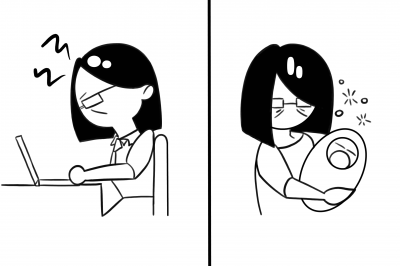The coronavirus has a relentless hand in all our problems. Just when we think it has stretched to the full extent of its reach, it grabs another sector of society and complicates our lives that much more.
Now, it has coupled its efforts with the patriarchy — something we cannot rid ourselves of either — to impose disproportionate effects on women in the workforce.
Of the 1.1 million workers who left their job in September, 80 percent were women, according to the U.S. Bureau of Labor Statistics.
We have regressed into a mindset that has hindered societal progression for so long: women must stay home with the kids.
It appears that this traditionally maternal responsibility has been unequally yoked on the plates of women. But the archetype of a doting mother who tends only to the needs of her family is truly archaic.
The reasoning for this exodus from the office isn’t necessarily that fathers are calling their wives home — it is important to recognize that this is a multifaceted issue.
Women are leaving their jobs to take on a newfound responsibility of caring for their children during this pandemic. We are far from “regular times,” when parents would have the option to send their children to day care centers or other services that would watch them during working hours.
But those options are obsolete as we battle the pandemic without a vaccine. Children are now home and interrupting the balance of parents’ work life. So, someone has to watch them, and why is it usually the mother?

Look at the persisting wage disparity between men and women: men are earning a dollar to every woman’s 82 cents, according to the U.S. Census Bureau. So when determining who gets to return to work, partners are, of course, inclined to keep the higher-earning person on the job, leaving more women at home.
Even if the women are still able to work, industries that are female dominated have been pummeled by the pandemic.
Jobs in hospitality, personal service — such as flight attendants and hairdressers — and food services have two things in common: they are dominated by women and are suffering from coronavirus lockdowns.
So for the traditional family, it is more than likely that one stream of income has been cut down during these times, and it was most likely the mother’s job.
Internalized patriarchy in business has often left women in spots that are deemed “less important,” and men are typically in higher-up, managerial positions. Only 24 women were CEOs on the Fortune 500 list in 2018.
Women can then be stuck at the lower levels, and during the pandemic, these jobs can pose heightened exposure to the virus.
These issues all compound on themselves to create a situation where women lose almost every time.
Such nuanced issues are difficult to combat, and must be addressed at every level of society, starting within the family.
We often praise fathers for fulfilling their expected duties and are nonchalant about the maternal devotion of a mother, yet they should share equal roles in caring for their children. Women should not be looked down upon for choosing a career over starting a family, and men should not be degraded if they choose to stay home.
Parental roles don’t call for a designated gender.
Businesses must also play a role in helping women and those who are mothers overcome gender discrimination.
Pregnancy leave should have better benefits, and not serve as a penalty for those who choose not to work. Large corporations should subsidize child care, but the unfortunate drawback is that women working for small businesses won’t always have access to those resources.
Child care can also be a super-spreader for the virus, and many facilities are not opening right now because of the health risks posed.
So of course, we circle back to our nemesis that is the coronavirus. It is forcing children home, which further disrupts the balance of work and family.
If children are allowed back at school, it will only be a matter of time before classes are canceled or they become exposed to the virus, inducing a necessary quarantine. These interruptions don’t run on schedule, and will be a sure inconvenience for working parents.
Some schools are also offering alternating days to attend classes, which is the worst of both worlds. A parent’s work flow must always be unevenly interrupted, making work structures all the more difficult to manage.
While we are all struggling through the monotonous yet unpredictable lifestyle that comes with the pandemic, we must not forget that oppression still holds prominence in our society. And we would be foolish to believe that it has not gotten worse.





















































































































